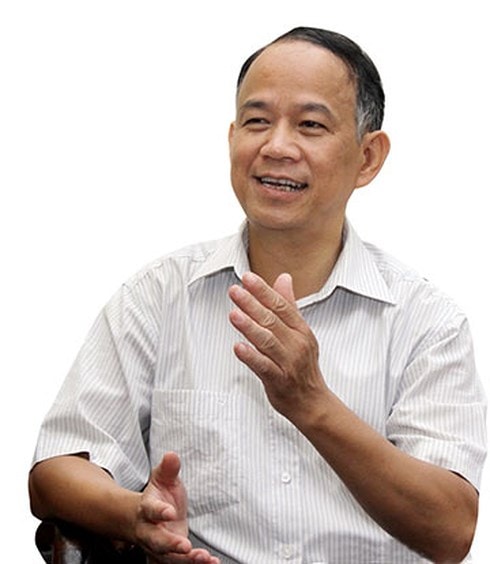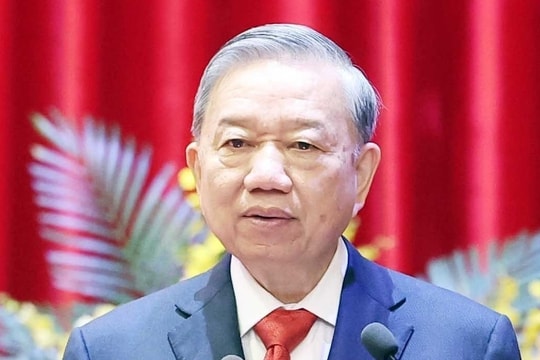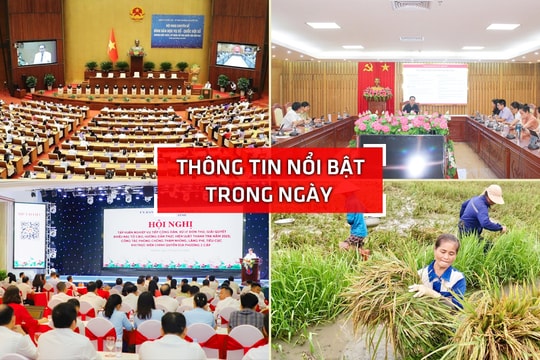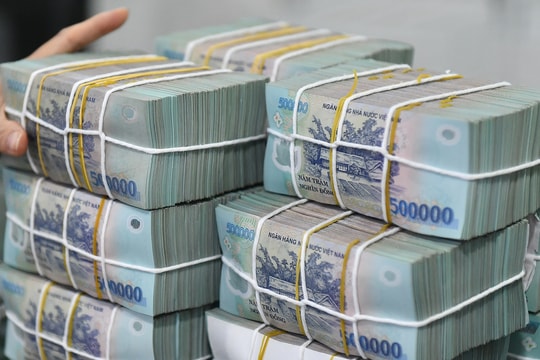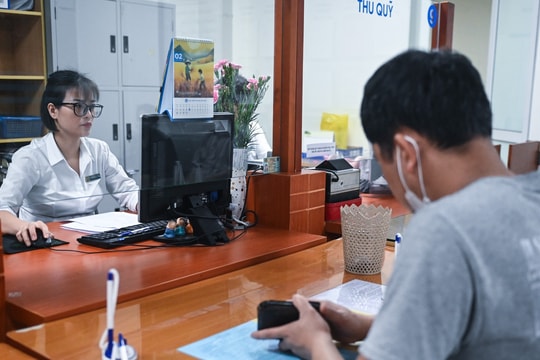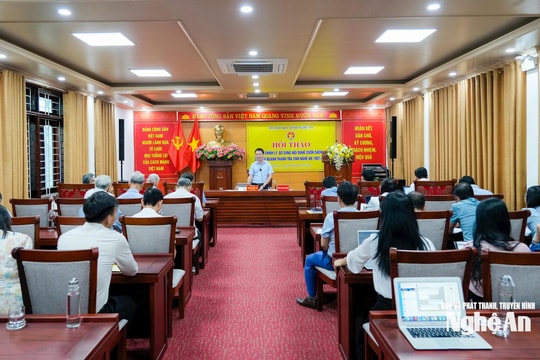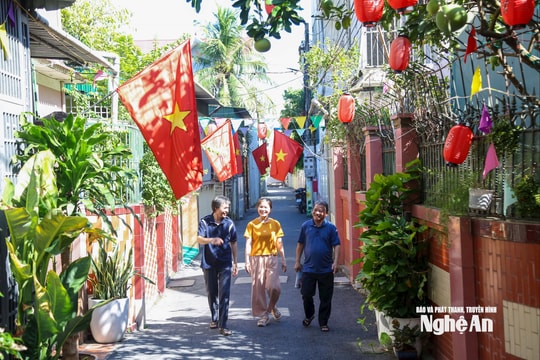Civil servants "traveling" with state budget money is a form of corruption.
Going abroad to perform official duties and gain experience is necessary, but public opinion is skeptical about the nature of those trips.
Is there a situation where officials take advantage of business trips to travel with state budget money? VOV reporter interviewed Dr. Nguyen Minh Phong - economic expert, Deputy Head of Propaganda and Theory Department - Nhan Dan Newspaper about this issue.
Going abroad as a form of welfare
PV: From the perspective of an economic expert, what is your opinion on the number and effectiveness of the recent trips for officials to conduct research and study abroad?
|
| Doctor of Economics Nguyen Minh Phong. Photo: Legal. |
However, in recent times, especially the recent statistics, it seems that there is something sudden and unusual, thus creating doubts about the effectiveness. That is at the macro level, but looking at some agencies, in that process, there is certainly "addition", "taking advantage" as well as using the name of going abroad to achieve goals beyond the mission.
But it must also be admitted that the effectiveness of going abroad is quite clear. For example, most recently in Hanoi, when Chairman of the People's Committee Nguyen Duc Chung sent a number of officials abroad to learn about green trees, it was clear that the green trees in Hanoi were much more beautiful. Or cases of training postgraduate students, scientific cooperation, especially international conferences and the results of negotiations on Agreements are also very good. But going abroad to survey the situation, to exchange in a short-term manner, I think the effectiveness is not very high.
PV: In your opinion, is it reasonable for people to be suspicious of such official trips?
Dr. Nguyen Minh Phong: Although there is no clear evidence for the comments of the people, I think they are well-founded. Going abroad is allowed and regulated in a number of Directives and Circulars: Accordingly, if a unit wants to go abroad, it must prepare a budget estimate, get it approved, then send someone to go, and write a report when they return. There is a decision to go on a business trip and valid documents to bring back about going abroad.
In the process of being a leader, to arrange people to go abroad, there is more or less a mentality of considering going abroad as a benefit for employees, especially those who are about to retire. So often those who are about to retire are arranged to accompany groups, in the name of short-term business trips of 5-7 days, even forming a separate group with the goal of exchanging and communicating with partner units but in reality it is to travel, considered as a treatment.
The trip's objectives are often not within the duties, tasks, or the right subjects as stated in Directive 102, and as mentioned, the insertion, addition, and removal of subjects as a form of welfare, or the relationship, creates the sending of people but not to the right subjects, causing budgetary waste.
It's good that recently the Government has had a very strict Directive, this type of group has almost been eliminated.
Dr. Nguyen Minh Phong: Currently, we do not clearly define who is allowed to go abroad and who is not. It is only stipulated that going abroad must be for the right task and the right person. Therefore, currently, the units managing going abroad still base their budget estimates on 4 criteria, and if approved, they find ways to "fill in" the ways to go.
The subjects often go in different capacities, creating a new “dress” that suits the nature of the person being sent. The goal is also recorded like that, and in the end, when returning to write the report, it is only written in fragments.
In short, in form it still complies with the law, but in reality only insiders know. Obviously the target was not achieved while the budget loss is real.
"Traveling" with state money is also a form of corruption
Reporter: A National Assembly delegate emphasized that local Party committees and authorities do not closely monitor and even facilitate overseas business trips for officials as a policy of preferential treatment or social welfare. From another perspective, this is also a manifestation of corruption. What is your opinion?
Dr. Nguyen Minh Phong: The delegate made a very frank comment. When leaders send officials abroad, especially those who are not suitable, they perceive it as a form of "soft" welfare that the workers enjoy. And many times the Party Committee also considers it as an implicit default. When sending this person or that person, the leader also considers it as a form of favor.
In particular, in practice, there are also cases where unit heads use budget money to invite cadres from other units (State units) to join the group, considering it a form of relationship, turning going abroad into a tool to bestow benefits, favors, and build relationships, creating a waste of money, especially foreign currency for the country.
If understood according to the new Anti-Corruption Law, you take advantage of your position for personal gain, then this is indeed a form of corruption. This is a phenomenon that needs to be identified, more determined, especially holding leaders accountable to minimize this situation.
PV: The situation of officials traveling abroad with state budget money is also seen as a form of group interest, sir?
Dr. Nguyen Minh Phong:Group interests in the sense of big corruption are not at that level, but it is clearly "what is good for others is good for us", considering budget money as free money and turning it into a tool to build relationships to demonstrate one's position and power.
The budget users can be classified into two types of errors: lack of responsibility causing loss of public assets; policy corruption. Although it is not corruption for oneself, when you turn it into a tool to bring prestige and relationships for yourself and your relatives, it is also a form of corruption. Corruption means you take advantage of your position for personal gain.
PV: In your opinion, how should foreign business trips be conducted to be reasonable and effective?
Dr. Nguyen Minh Phong: In terms of text, we have quite enough. But we should also distinguish between benefits for beneficiaries (people preparing to retire) and foreign work regimes, to prohibit their inclusion here as a form of exploitation; clearly state which behaviors are allowed and which are not allowed, especially sanctions for these behaviors, especially for leaders so that leaders will be held responsible administratively, including financially. At the same time, those who benefit but are not the right subjects may have to return the money or pay more as a sharing.
State agencies should have specialized assessments and audits, especially performance audits and compliance audits of foreign trips.
It is understandable for the boss to arrange for a cadre who is about to retire to go abroad, considering it as a form of welfare in return. But in law, it must be clearly distinguished that cadres who go abroad for work must be completely separate, while those who are about to retire and enjoy some kind of welfare should have additional research, some form such as domestic tourism, or capital-contributing tourism to avoid ambiguity, and be included in the program.
PV: Thank you!./.

